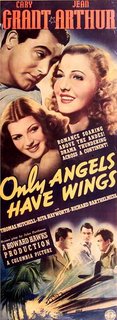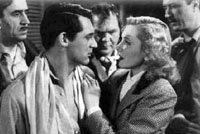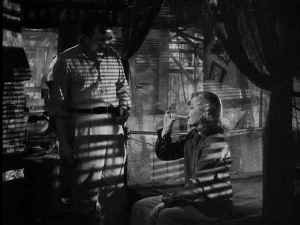Only Angels Have Wings
 Let it never be said that Latin Americans have a monopoly on machismo. If Howard Hawks's Only Angels Have Wings has no other point, it is to project an image of sturdy US masculinity, shielded from emotion or weakness by the rituals of camaraderie.
Let it never be said that Latin Americans have a monopoly on machismo. If Howard Hawks's Only Angels Have Wings has no other point, it is to project an image of sturdy US masculinity, shielded from emotion or weakness by the rituals of camaraderie.Cary Grant plays Geoff Carter, a no-nonsense "man's man" who's running an airline in the South American banana port of Barranca. His job is to ensure mail delivery over the Andes, but his planes can only just clear the lowest pass, at 14,000 feet.
What's more, the cordillera is frequently clouded in, while down at sea level the airstrip is often affected by fog as well as by near interminable rain. The young fliers who work for Carter have to take death in their stride. Early on, one of them is killed as he crash lands in the fog. He's consigned to instant oblivion by his comrades: "Who's Joe?" they say of their absent (former) friend.
Beyond the aerial stunts, brief shots of a mountain lookout from which "Tex" reports back to base on conditions at the pass, and an opening sequence on the wharf and in the bars of the town, the film's action takes place almost exclusively in the hotel and bar run by John "Dutchy" Van Reiter. Dutchy's bankrolling the airmail operation, and if he can fulfill his pledge to deliver the mail on time for one more week he's guaranteed a government contract and subsidy--with which he could buy more powerful planes that could soar more easily over rather than through the mountain range.
For the time being, though, Carter, Dutchy, and the young American fliers remain hemmed in, between ocean and cordillera, in a country whose culture and language none of them know (nor seem interested to learn), stuck in the bar when they're not up in the air, while outside all is rain, fog, cloud, and dark. They are forced to be independent, self-reliant, and affect indifference to the world around them, as though in revenge for the fact that that world seems to offer them little comfort or respite.
 Into this charmless circle wanders Bonnie Lee (Jean Arthur), a speciality chorus girl en route from Valparaiso to Panama whose boat stops in Barranca for a brief few hours. Long enough, however, for her to be captivated by this outpost of endangered fraternity, while also shocked by its callous disregard for sentiment.
Into this charmless circle wanders Bonnie Lee (Jean Arthur), a speciality chorus girl en route from Valparaiso to Panama whose boat stops in Barranca for a brief few hours. Long enough, however, for her to be captivated by this outpost of endangered fraternity, while also shocked by its callous disregard for sentiment. She chooses to stay on, at least until the next boat passes at the end of the week, and so witnesses a second feminine intrusion into the aviators' cramped environment: Judy MacPherson (Rita Hayworth's first major role) is Carter's former love interest, now married to an airman shunned by his colleagues for having broken their code of conduct, baling out of a stricken plane and allowing his mechanic to die.
Both women threaten but also affirm many of the airmen's values: Bonnie introduces some domestication (making a pot of coffee, which is initially denounced as "cooking," but later welcomed) as well as pressing Carter on his past, but she eventually takes up the refrain of "Who's Joe?" and ends the movie on the point of suppressing her own emotions by moving on, taking the next boat rather than staying in town. Judy, too, promises to be a disruptive influence, reminding Carter of all he has left behind, only to take on his tough-minded code of loyalty by learning to stick even with her disgraced husband.
In the end, some kind of compromise is achieved. Bonnie effectively takes the place of Carter's buddy, the older pilot ironically nicknamed "Kid," who dies manfully and alone but not before admitting his love for the man he calls "Poppa." Carter finally, but indirectly, asks Bonnie to stay with him, after shedding a reluctant tear or two for Kid's death.
And Judy commits herself to protect her wounded man. Not that he is alone: for these are all suffering bodies that we see on the screen. When Carter is accidentally shot in the shoulder, he's greeted with the observation "You've joined the rest of us cripples." These men are debilitated by their physical, emotional, and psychic injuries, but feel that their masculinity is demonstrated only by carrying on regardless.
Latin America has often been portrayed as a suitably rugged environment in which to test and prove masculinity: this is a theme that unites an entire tradition of movie-making from (at least) The Lost World onwards. Only Angels Have Wings does briefly offer an alternative, when at the very outset Bonnie peers into a bar in which the locals are dancing and singing, and finds herself carried away by the music and rhythm. But she soon rejects the possibility of immersion in local culture, and is delighted to meet fellow Americans: "Sure sounds good to hear something that doesn't sound like pig Latin."
As a result, however, she enters the caged world of paranoid masculinity constructed by these wounded Americans abroad.

Labels: howard hawks, masculinity
